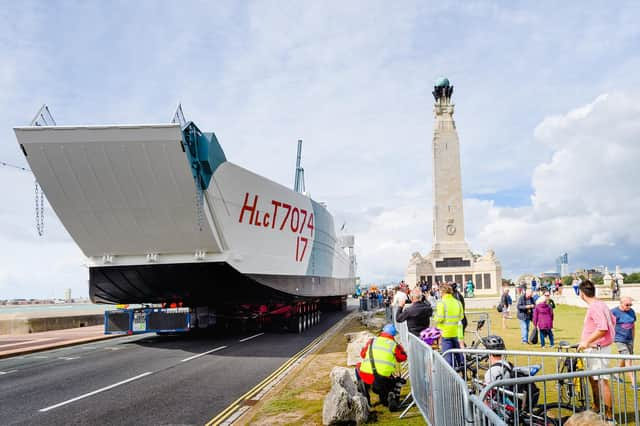Let's keep naval construction in Britain | Stephen Morgan


From the individually rivetted-armoured panels to the design allowing no less than 10 tanks aboard, the mastery that went into constructing these vessels and the rapid rate at which they were produced is a testament to our nation’s shipbuilding ability.
More than three quarters of a decade on, it is deeply concerning that our current government is risking our nation’s future capabilities by offering out contracts for British naval vessels to be built by foreign parties.
Advertisement
Hide AdAdvertisement
Hide AdThe government’s reluctance to commit to letting British shipyards construct the Fleet Solid Support Ships, integral to maintaining the capability of Portsmouth’s own Queen Elizabeth Class Carriers, raises several red flags.
Firstly, awarding this contract to British shipyards would generate 2,500 new jobs at a time of great financial insecurity due to the Covid-19 pandemic.
This is backed up by research conducted by Oxford Economics outlining that for every £1m spent in UK manufacturing, there is a further £1.5m benefit for the wider economy.
It is short-sighted of the government to potentially put saving a quick buck ahead of safeguarding the future of British shipbuilding for generations to come.
Advertisement
Hide AdAdvertisement
Hide AdWe also need to ask the question: do we really want foreign companies building ships integral to our national security?
The government is using a technicality that states as the supply ships will be part of the Royal Fleet Auxiliary, they are not classed as warships, to justify their reasoning for allowing them to be built overseas.
This would make Britain almost alone in putting the construction of their naval vessels out to tender abroad.
That is why I’m proud to be part of the team that launched a simple test in a bid to stop the government from inflicting further damage on our shipyards.
Advertisement
Hide AdAdvertisement
Hide AdThe premise is uncomplicated: what can be built in Britain now, must be built in Britain.
A long-term defence and security procurement must also involve plans to develop the UK’s future capacity to build in Britain, as part of the Integrated Review.
The government’s dithering, ill thought-out decision making and disregard for our nation’s military heritage must be stopped.
Working with anyone with the same aim, I will continue to take action to secure the future of our shipyards and jobs of workers.
Advertisement
Hide AdAdvertisement
Hide AdTo maintain our national security, sovereign capability, and out of respect to those that created the landing crafts – such as the LCT7074 – more than 75 years ago, Labour will fight for future naval construction to stay on our shores in the United Kingdom.
This column is part of our Off The Fence rota, whereby MPs from our region write about a topic of their choice.